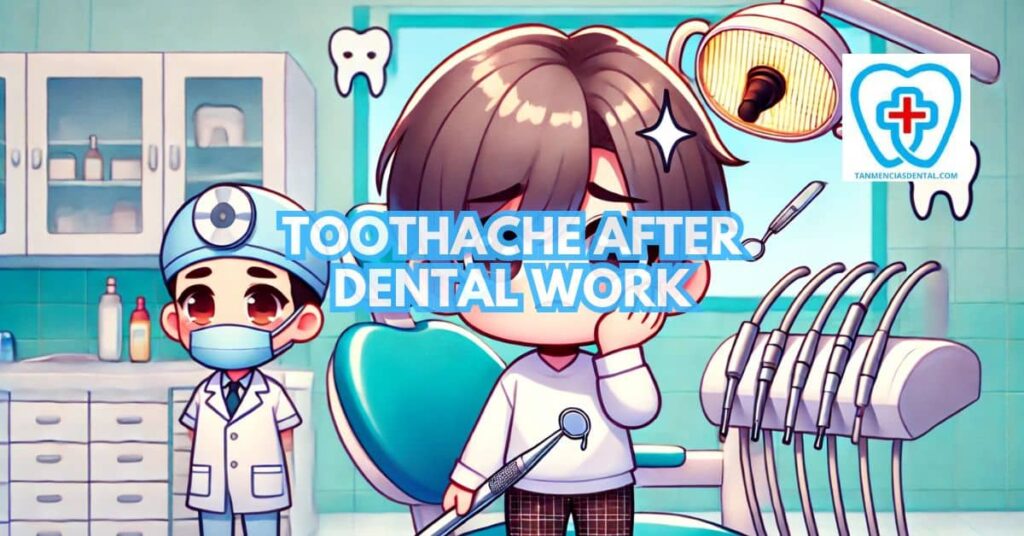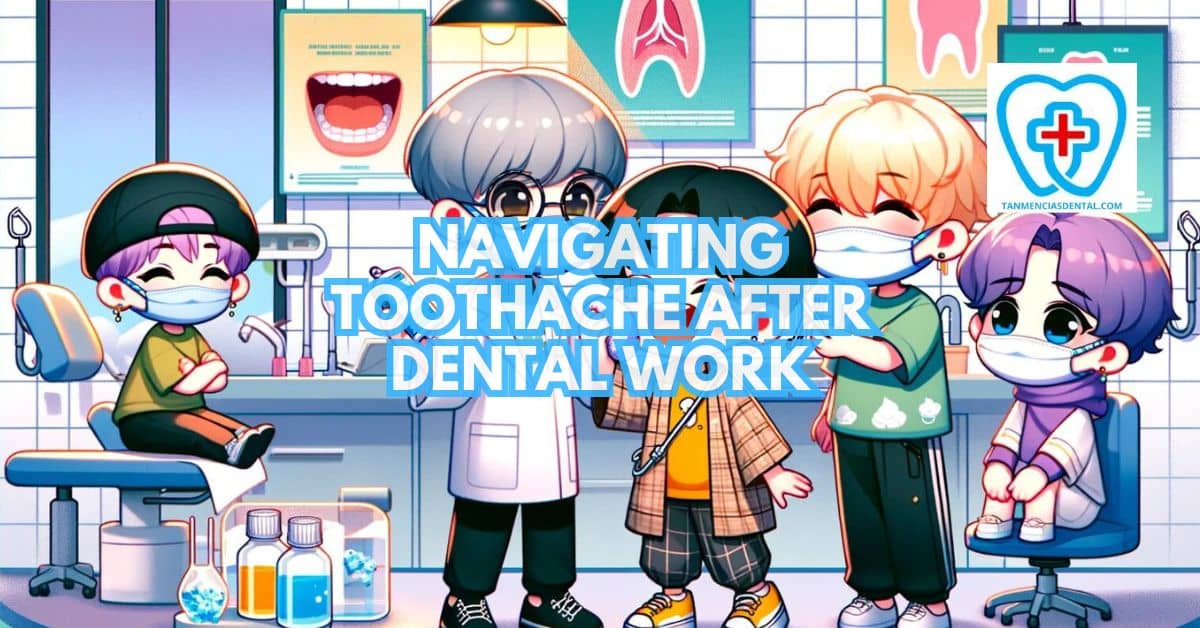Experiencing a toothache after dental work is common as your mouth heals from the procedure.
This pain can feel sharp or dull, depending on the type of dental treatment and your sensitivity.
It’s important to know the difference between normal healing pain and signs that something might be wrong.
Understanding what to expect can help you manage your recovery better.
We’ll explore the causes of toothache after dental work, effective remedies, and ways to find relief.
1. Is It Normal? Understanding Post-Dental Work Toothache
Experiencing pain after dental work, such as receiving a dental filling, is quite typical and usually isn’t a cause for concern during the initial days following the procedure.
This discomfort often results from the body’s natural inflammatory response as it begins to heal the tissues that were manipulated during the treatment to remove a cavity or repair a tooth.
The area around the treated tooth may become sensitive as part of this response, contributing to the pain you feel.
Normal post-dental pain should respond well to over-the-counter pain relievers and gradually diminish over a few days.
It’s important to monitor how the pain evolves; it can often give you valuable insights into how well the area is healing.
However, if you experience tooth pain that becomes persistent or worsens over time, this is not considered normal and should be promptly evaluated by a dental professional.
Such symptoms may indicate that further intervention is needed to address complications or adjust the treatment.
🦷 Can You Still Get Your Teeth Professionally Cleaned While Wearing Braces?
2. Common Culprits: Causes of Toothache After Dental Work (Fillings, Crowns, Root Canals)
Toothaches after dental work such as fillings, crowns, and root canals can arise from various sources.
One common reason is irritation of the nerve within the tooth, which can make it sensitive to hot or cold drinks and even mild pressure.
This type of pain may also result from inflammation caused by the dental tools or materials used during the procedure.
In some instances, a high bite can lead to discomfort, as the treated tooth might press harder against its opposing tooth when you bring your teeth together.
The surrounding gums could also become tender or inflamed, especially if there was significant probing or adjustment during the treatment.
Occasionally, a new filling or crown may not fit perfectly, creating additional strain on the tooth and the tissues around it.
Identifying the specific cause of your discomfort is essential for proper treatment, so describing the exact type of pain and its triggers to your dentist can make a big difference.
🦷 Why Are Dental Crowns So Expensive, and Is It Worth the Investment?
3. Soothing the Ache: Home Remedies for Pain Relief
For immediate relief from toothache after dental work, applying a cold compress to the cheek near the affected area can be a great way to reduce swelling and numbness.
Over-the-counter pain medications such as ibuprofen or acetaminophen are effective for managing moderate pain and can help control the discomfort that often accompanies tooth sensitivity following procedures.
It’s advisable to avoid chewing on the side of your mouth where the dental work was performed; doing so helps prevent aggravating the area, especially if a new filling may be sensitive.
Rinsing your mouth gently with warm salt water several times a day can aid in reducing inflammation and keeping the area clean, which is essential for healing.
These simple remedies are often enough to provide significant relief during the initial recovery period after dental treatment.
Additionally, avoiding extremely hot or cold foods can prevent sudden spikes in tooth sensitivity.
Employing these measures can make the days following dental treatments more comfortable and prevent complications related to pain and sensitivity.
🦷 Overcoming Common Challenges of Dental Cleanings with Braces: Tips You Need to Know
4. Eating Right for a Quick Recovery
After dental work, it’s important to choose soft foods that won’t irritate your sensitive teeth and gums.
Foods like soups, smoothies, and yogurt are gentle on your mouth and provide the nutrients your body needs to heal.
Incorporate items rich in vitamins C and D, such as oranges and fortified milk, to help repair tissues and strengthen your teeth.
Avoid hard, crunchy, or sticky foods that could cause pain or damage to the treated area.
Eating a balanced diet and staying hydrated can speed up your recovery and reduce discomfort.
🦷 Choosing the Right Dentist for Your Kids: Essential Tips Every Parent Should Know

5. Brushing and Flossing Essentials: Gentle Care After Dental Work
After dental work, it’s crucial to maintain oral hygiene with gentle care to support healing.
Use a soft-bristled toothbrush to avoid irritating the sensitive areas, and opt for a fluoride toothpaste that can help strengthen the teeth without being harsh.
Brush gently around the affected area, taking care not to pull on any stitches or disturb the healing of the tissues.
Flossing should be done carefully, using a slow and gentle sawing motion to clean between teeth without applying excessive force.
Keeping the mouth clean helps prevent infection and promotes faster healing.
🦷 Oral Surgery vs. General Dentistry: Understanding the Key Differences
6. When to Call Your Dentist: Red Flags for Professional Attention
It’s essential to recognize when discomfort or pain after dental work suggests a need for professional evaluation.
If you feel pain that is severe and does not improve with over-the-counter painkillers, it may signal an underlying problem such as an infection or an improperly fitted dental appliance.
Such pain might present as a persistent, throbbing pain that disrupts daily activities.
Other critical signs include swelling that spreads to other areas of the face or neck, persistent bleeding, or an escalation in pain after the initial recovery phase.
In addition, if you experience a fever and notice an unpleasant taste or smell coming from the affected area, these are urgent symptoms that require immediate attention from your dentist.
These symptoms can indicate complications that, without prompt treatment, may worsen or lead to more serious health issues.
Recognizing and responding to these red flags can help ensure a quicker and more effective resolution to any post-dental treatment complications you may experience.
🦷 Your Complete Guide to Tooth Restoration in Marikina: How to Regain Your Confident Smile
7. Effective Communication: Talking to Your Dentist About Your Pain
When discussing pain with your dentist, be specific about the location, nature, and triggers of the pain.
This detailed information helps your dentist diagnose the issue more accurately and tailor the treatment to your needs.
Describe the pain as throbbing, sharp, constant, or intermittent, and note whether anything in particular seems to worsen or alleviate it.
Don’t hesitate to communicate if you feel the pain management strategies initially suggested are not effective.
A good dentist will appreciate your input and work with you to adjust your treatment plan.
🦷 How to Choose the Perfect Family Dentist: What to Look for in Your Care Provider
8. Preventing the Ache: Proactive Steps to Minimize Discomfort
To minimize discomfort after dental work, discuss all available pain management options with your dentist before the procedure.
This can include pre-medicating with pain relievers or using specific numbing techniques during the procedure.
Wearing a nightguard can help if you clench or grind your teeth, which might exacerbate post-procedural pain.
Avoid foods that are extremely hot, cold, or hard in the days following your dental work.
Plus, practicing relaxation techniques can help reduce overall pain perception by lowering stress, which often intensifies the sensation of pain.
🦷 The Vital Role of Children’s Orthodontics: Helping Little Smiles Grow Strong and Straight
9. Follow-Up Care Matters: Why Regular Checkups Are Key
Regular dental checkups are crucial to ensure that your mouth is healing properly after any dental work.
These visits allow your dentist to monitor the progress of your recovery and catch any potential issues before they become serious.
Follow-up appointments often involve examining the treated area, ensuring that the restoration is functioning correctly, and checking for signs of infection or other complications.
Early detection of problems can significantly simplify treatment and improve outcomes.
Maintaining a schedule of regular checkups supports long-term dental health and prevents future discomfort.
🦷 What to Ask Your Dentist Before Tooth Extraction: Key Questions You Shouldn’t Skip
10. Long-Term Defense: Maintaining Good Oral Hygiene Habits
Maintaining robust oral hygiene is essential for preventing future dental problems and minimizing discomfort after any dental procedure.
Brushing twice a day, flossing daily, and using an antiseptic mouthwash can drastically reduce the likelihood of plaque buildup and gum disease.
It is also beneficial to avoid smoking and reduce the intake of sugary foods and drinks, as these can contribute to tooth decay and gum issues.
Regularly changing your toothbrush and visiting your dentist for professional cleanings are also important steps.
These habits are your best defense against future dental pain and complications.
🦷 Is Your Nighttime Routine Sabotaging Your Smile? The Truth About Eating After Brushing
11. Peace of Mind After Treatment: When to Expect Relief
After dental work, it’s normal to experience some level of discomfort, but knowing when to expect relief can ease anxiety.
Most minor toothaches should begin to diminish within a few days and completely subside within a week or two.
If your dentist has prescribed pain medication, following the dosage instructions closely can provide significant relief.
Persistent or worsening pain after this period may require further dental assessment.
Understanding this timeline helps manage expectations and reduces stress during the recovery process.
👨⚕️ Conclusion
Managing toothache after dental work is crucial for both comfort and overall oral health.
By understanding the causes of post-procedure pain, employing effective pain management strategies, and maintaining diligent oral hygiene, you can greatly enhance your recovery.
Regular communication with your dentist and timely follow-up care ensure any issues are addressed promptly, leading to better health outcomes.
Ultimately, taking proactive steps to manage your dental health post-treatment can lead to a quicker and more comfortable recovery, keeping your smile healthy and pain-free.
😊 Self-Promotion
At Tan-Mencias Dental Clinic in Parang, Marikina City, we’re ready to brighten your smile and ensure your dental health is at its best!
Feel free to give us a call at 9171451074 with any questions, or reach out through our easy-to-use contact form on our website.
You can also send us a message directly through our Facebook page for quick, convenient communication.
Our friendly team is here to provide you with personalized care and answers to all your dental queries.
Visit us today and experience dental care tailored just for you in a welcoming and positive environment!

